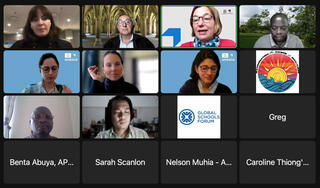This year, the Comparative & International Education Society Conference took place in Minneapolis, USA, between 18th and 22nd of April 2022. The theme of the conference was “Illuminating the Power of Idea/lism” that sought to address the challenges caused by the COVID-19 pandemic and the rise of nativism and fundamentalism. The University of Glasgow was represented by members of two large projects, both of which are part of CR&DALL’s portfolio.
The Gendered Journeys project is led by Barbara Read and also involves Catherine Lido, Srabani Maitra and Bonnie Slade as Co-Is and Preeti Dagar and Daniel Leyton as researchers together with partners from the University of Rwanda and the Indian Institute of Management Calcutta. The Centre for Sustainable, Healthy and Learning Cities and Neighbourhoods (SHLC) is a multi-partner project within which Mike Osborne has been a Co-I, and Yulia Nesterova, a researcher. Both projects have been funded within the aegis of the UK Government’s Global Challenges Research Fund (GCRF).
Members of the Gendered Journeys project organised a panel session with three presentations. The first paper focussed on Rwanda’s structures of inequality in STEM, by Jane Umutoni and Josephine Malonza (University of Rwanda). The second paper addressed micropolitical experiences of disparities in India led by Srabani Maitra (University of Glasgow) and Saikat Maitra (Indian Institute of Management Calcutta). The third paper, by Bonnie Slade and Barbara Read (University of Glasgow), discussed some creative methods of collecting data online during the COVID-19 pandemic. Professor Bonnie Slade chaired the session, which ended with an engaging interaction with the audience regarding how gender shapes STEM choices, and the issues of harassment and bullying within STEM fields worldwide. Altogether, they tackled issues related to power struggles, structural inequalities and micro-cultural operations of misogyny and gender collusions.
For example, drawing on qualitative research with STEM female students in some of the leading universities in the eastern region of India, the team reported a culture of misogyny and gender collusions in STEM disciplines. The team reflected on how this culture is impacting female students studying engineering and other science-related fields. The team highlighted that these experiences often leave female students in STEM in affective situations marked by isolation, anger, and feelings of oppression. The panel called attention to the necessity of inclusive initiatives that explicitly address sexism and misogyny, and recognise the STEM field as part of a broader social context in which gender oppression persists.
The SHLC team presented two papers. The first paper relied on the newly collected SHLC data from the household survey conducted in the project’s fourteen cities in seven countries in Africa and Asia (over 14,000 surveys in total and quite possibly the largest survey of its kind globally). Dr Yulia Nesterova, with another Co-I of SHLC from the School of Education, Professor Michele Schweisfurth, discussed the levels of satisfaction with the quality of schooling in neighbourhoods of different income – from informal settlements to gated communities – in Bangladesh, India, Rwanda, and Tanzania. They highlighted that in order to address educational inequalities and achieve SDG4, researchers and policymakers need to adopt the neighbourhood lens to understand how opportunities and challenges are unevenly distributed across cities.
The second SHLC paper was presented by Professor Mike Osborne and Dr Yulia Nesterova as part of the panel organised by UNESCO-IIEP. The panel’s objective was to showcase how cities can be laboratories for innovation as they work to achieve SDG4 locally. Cities play a leading role in the urgent need to implement the United Nations’ Sustainable Development Goals (SDGs), and particularly SDG 4, which aims to ensure universal access to quality education. Through a dedicated programme, Cities and Education 2030, a IIEP-UNESCO research team is considering the key role of cities in educational planning and management, as local elected authorities and privileged partners of ministries of education. IIEP-UNESCO first explored this growing phenomenon in four French cities and has since put together recommendations on how to improve the role of cities in educational planning and management. It has been more recently working with the Centre for Sustainable Learning Cities and Neighbourhoods to extend this work to the global south in Bangladesh, the Philippines and Rwanda.
In particular, during this panel, SHLC’s team discussed how Kigali in Rwanda and Dhaka and Khulna in Bangladesh plan, monitor, evaluate, and finance education in their cities, how the cities build partnerships with diverse actors and stakeholders, and what challenges and opportunities they identify. This discussion was informed by the insights of Co-Is from Bangladesh (Dr Shilpi Roy) and Rwanda (Dr Vincent Manirakiza). More detail on this panel as a whole will be posted in a subsequent news item.
- Log in to post comments














Latest Comments